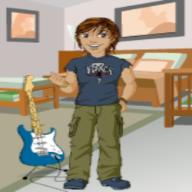我想問點解要
will you be free tonight?
why not:
will you free tonight?
個be係由於被動嗎?
be.....的用法
2007-04-22 5:52 pm
回答 (4)
2007-04-22 6:45 pm
✔ 最佳答案
可以參考一下我之前的[最佳回答].....be 其實=is, am, are (視乎subject/主位/主角是什么),
過去式便變成was, were
完成式變成has been, have been,
將來式變成will be, shall be
當然也有進行式 being了
(還有很多"式"的, 起碼要到高中才會學到, 看你的問題, 先弄清以
下的基礎用法吧)
用法:
1) be + noun
e.g. I am Peter.
This is a book.
We are students.
2) be + adj
e.g. I am fat.(現在這些日子)
She was fat when she was in primary school. (現在己經不胖了)
Mary has been fat for 25 years.(25年前是胖子, 直至現在仍是胖子)
3)be+ verb(ing/present participle/現在分詞)(表示進行式)
e.g. I am singing now.
I was watching TV last night at 8 o'clock.(昨晚8時我正在看電視)
I will be watching TV tomorrow night at 8 o'clock.(預計明晚8時
我應該正在看電視)
4)be+verb(past participle/過去分詞)(表示被動式)
e.g. The apple was eaten by John yesterday.(主角是個蘋果)
a)The apple is now being eaten by John now.(本來是 be eaten,
但進行式是要 be + verbing 所以變成 is being eaten )另外一個
差不多的例子:
b) The naughty students are being punished by their teacher now.
(因為是students , 不用 is 而用 are ,請參考本答案第一句)
The project will be finished next Monday. (將來式)
The project has been finished for 3 hours. (完成式)
(這是英文跟中文的一大不同之處, 英文要將[重點/主角/subject]放在
句子最頭的, 只要看看英文的問句就明白我的意思)
例如:你在吃什么?但英文就要這樣問: What are you eating?
([什么]才是問題的重點, 而不是[你])
而你的問題是因為[free] 是[形容詞/ adjective] , 即要用[be] 的用途 (2)
參考: 英文幾ok的自己
2007-04-22 6:03 pm
No,it isn't.
It is because every sentence should have a verb,
but this sentence"will you free tonight" doesn't have any verbs,
since "will" is just an auxiliary verb, that means it isn't a real verb.
Hence, "be" is a verb in this sentence.
And the sentence should be "will you be free tonight?"
Understand?
It is because every sentence should have a verb,
but this sentence"will you free tonight" doesn't have any verbs,
since "will" is just an auxiliary verb, that means it isn't a real verb.
Hence, "be" is a verb in this sentence.
And the sentence should be "will you be free tonight?"
Understand?
參考: ME
2007-04-22 5:59 pm
This is the rule of grammar.
參考: me
2007-04-22 5:57 pm
free唔係verbs~
所以要+be~
所以要+be~
收錄日期: 2021-04-29 11:37:53
原文連結 [永久失效]:
https://hk.answers.yahoo.com/question/index?qid=20070422000051KK01031

